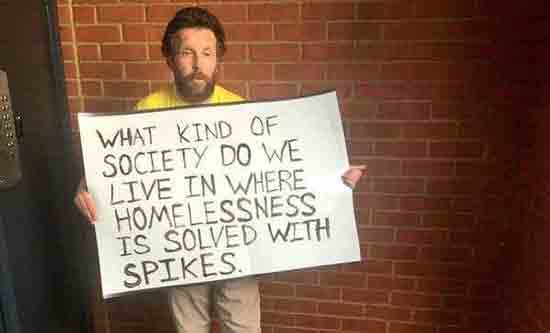
‘The overwhelming success of the ideological campaign that supports neoliberal policies is that it has succeeded in convincing people that those in poverty have no one to blame but themselves, while supporting the notion that trickledown policies will address it.’
Philip Alston,
UN special rapporteur on poverty, July 2020
Global pandemic – global poverty
The World Bank estimates that 71-100 million people worldwide risk falling into extreme poverty as a result of the pandemic. The number facing acute food insecurity is expected to more than double to around 270 million by the end of the year and the International Labour Organisation predicts that up to 340 million jobs could be lost.
In his final report on extreme poverty and human rights published in July 2020, outgoing UN special rapporteur Philip Alston launched a scathing attack on the perpetrators of this catastrophe:
‘The international community’s abysmal record on tackling poverty, inequality and disregard for human life far precede this pandemic … Even before Covid-19, we squandered a decade in the fight against poverty, with misplaced triumphalism blocking the very reforms that could have prevented the worst impacts of the pandemic.’
Poverty in Britain
A decade ago, in the wake of the 2008 global financial crash, Martin Wolf, chief economic commentator at the Financial Times, described the ConDem government’s 2010 budget cuts as ‘a bloodbath none was prepared for’. Ten years of barbaric cuts led to 75% of wealth in Britain being held by people in the wealthiest 30% of the population, compared with just 2% of wealth for those in the bottom 30%. This mass transfer of wealth took place before the coronavirus crisis triggered what is set to become the worst crisis of capitalism the world has ever seen. If the government’s attack on the poor was a bloodbath before, words cannot describe what is around the corner.
The Office for National Statistics reported that paid employment in Britain plunged by almost 650,000 employees between March and June. Hours worked each week plummeted by 175m between March and May from the same period last year, the steepest fall since records began in 1971. Average total pay across the workforce fell by 0.3%, the biggest fall since 2009. As many as 9.4m jobs have been furloughed on the government’s wage subsidy scheme, which is being scaled back and will end completely at the end of October. Up to 20% of people on the scheme are forecast to become unemployed. As many as half a million people away from work in May because of the pandemic received no pay. Unemployment is predicted to reach a peak of 12% before Christmas – the highest since the 1980s.
Those already battered by austerity are being repeatedly kicked when they are down: 65% of adults already experiencing deep poverty prior to the crisis have suffered reduced earnings, job losses or furlough compared to 35% of those living in families with incomes more than 20% above the poverty line. The Institute for Fiscal Studies 25 June report, ‘Living standards, poverty and inequality in the UK: 2020’, found that the Covid-19 crisis hit at a time when low-income households had already ‘experienced five years of real income stagnation between 2013-14 and 2018-19. This was entirely due to falls in income from working-age benefits and tax credits’. Employees in low-paid ‘shut-down sectors’, such as hospitality, were already almost twice as likely to be in poverty as employees in other sectors.
The UN and World Economic Forum have warned that the pandemic could set women’s economic progress back half a century (see: Covid-19 and the childcare crisis). Part-time jobs fell by 70% in Britain in the first 11 weeks of the pandemic. This hit women particularly hard because they make up three-quarters of part-time workers. The meagre and temporary increases in benefits announced in response to the pandemic are a drop in the ocean. Benefits are 12% lower in 2020-21 for workless households with children than in 2011.
Children paying for the crisis
There were 14.4 million people in Britain living in poverty in 2018-19, of whom 4.5 million were children. That is 30% of children, or nine in a classroom of 30. In-work poverty has become the norm; 72% of children growing up in poverty live in a household where at least one person works. Low wages and not enough hours are to blame: 68% of working-age adults (5.6 million people) were in families where at least one person worked part time. Nearly a third of people in poverty are living on less than half of what they would need simply to get above the poverty line.
More than 11,500 children under 16 have been admitted to hospital with malnutrition since 2015 – an average of 103 children every week. The number of households with children going hungry doubled during lockdown and as many as 7.7 million adults cut down or missed meals because they could not afford food. Trussell Trust food banks handed out 89% more food parcels in April compared to the same month last year.
The latest annual report by the Social Metrics Commission found that nearly half of black and minority ethnic households in Britain are living in poverty. They are over twice as likely to live in poverty as white British households. Around one in 10 adults from a Black British, Pakistani, Bangladeshi or mixed background were unemployed, compared with one in 25 white British people, leaving them disproportionately exposed to the hardship caused by the pandemic.
The global capitalist system was not just ill-prepared for the pandemic – it is structurally unable to deal with such events without plunging millions into poverty and an early grave.
Mark Moncada
FIGHT RACISM! FIGHT IMPERIALISM! 277 August /September 2020




